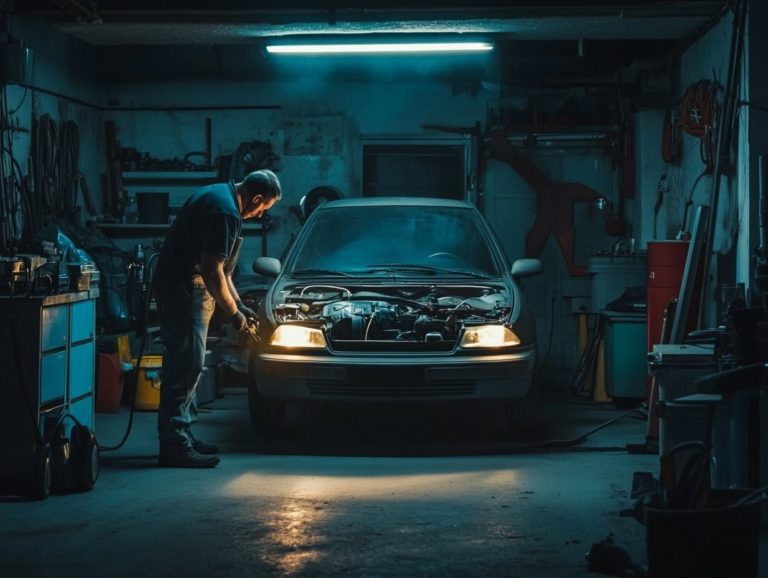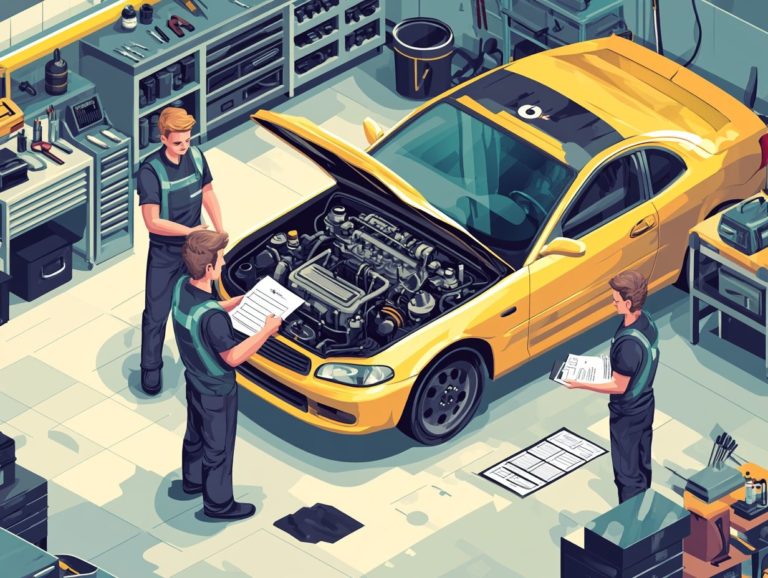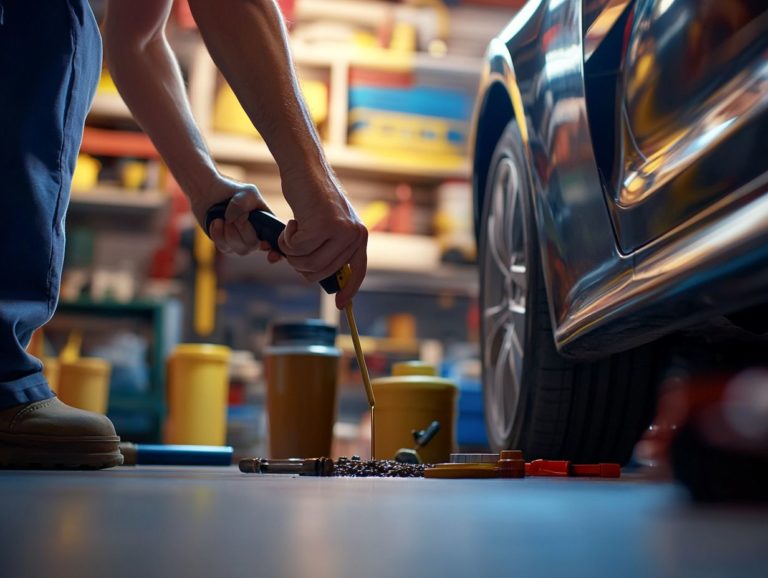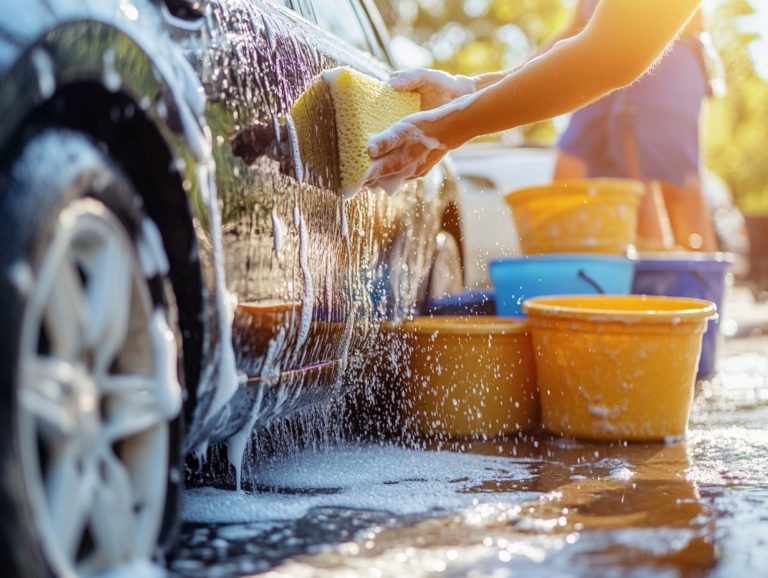What Are the Signs of Cooling System Failure?
Maintaining your vehicle’s cooling system is essential for preventing overheating and safeguarding the overall health of your engine.
This article delves into the key components of your cooling system and their specific functions. You’ll discover common signs that may indicate impending failure, including overheating, fluid leaks, and unusual noises.
Gain insight into the underlying causes of cooling system issues, effective diagnostic techniques, and critical maintenance tips to help you steer clear of costly repairs.
Don t wait! Keep your vehicle in top shape and enjoy every drive!
Contents
Key Takeaways:
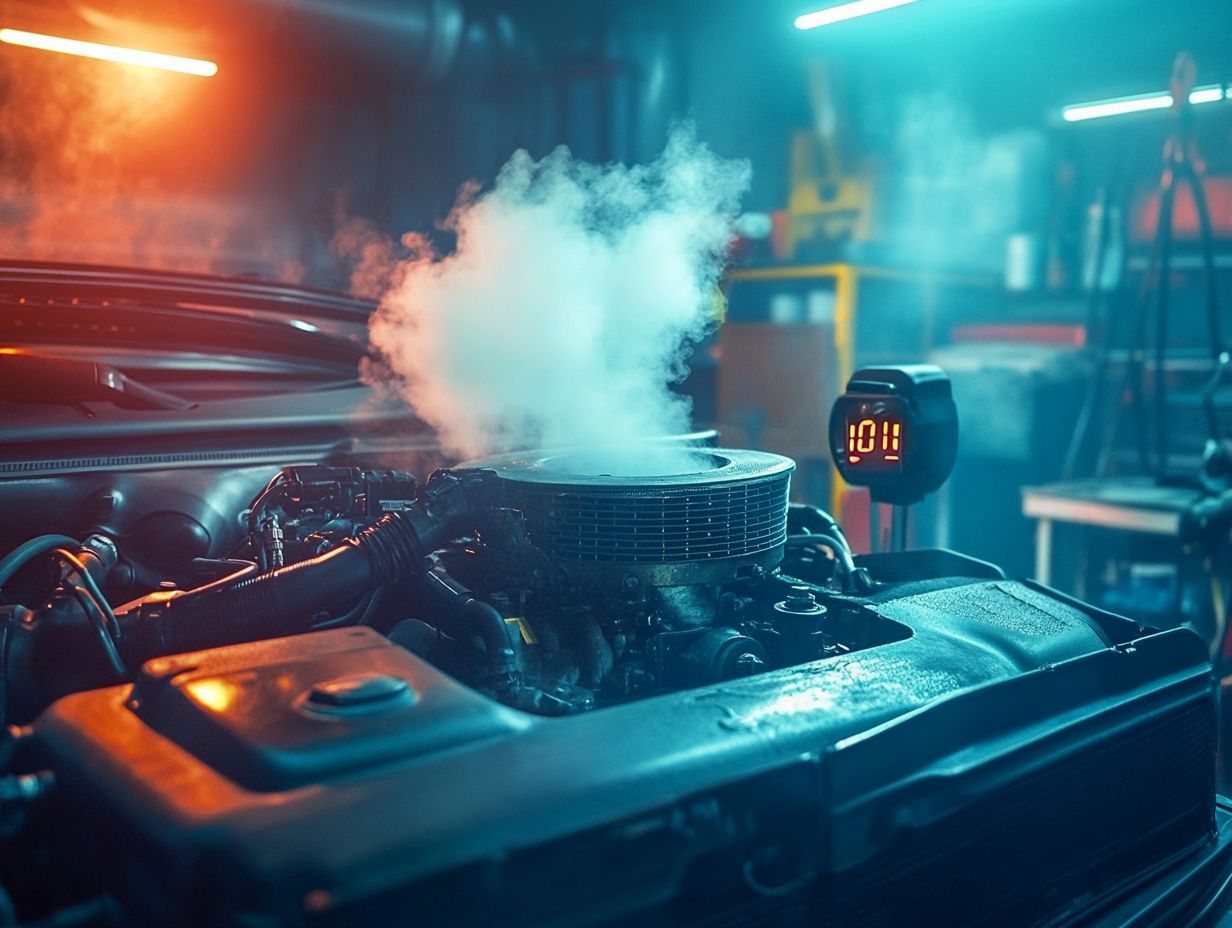
- Overheating is a common sign of cooling system failure and should be addressed immediately to prevent further damage to your vehicle.
- Leaking fluid, strange noises, or smells can also indicate a problem with your cooling system and should be investigated by a professional mechanic.
- Regular maintenance and proper care can help prevent cooling system failure, prolong the lifespan of your vehicle, and save you from costly repairs.
Understanding Your Vehicle’s Cooling System
Understanding your vehicle’s cooling system is essential for maintaining optimal engine performance and preventing potential failures that could result in expensive repairs.
This system has an important job, regulating engine temperature by circulating coolant through the radiator and engine, effectively safeguarding against overheating.
Key components like the water pump, radiator, and thermostat collaborate seamlessly to dissipate heat and manage coolant levels. By prioritizing regular inspections and maintenance, you can identify issues early, ensuring your cooling system operates efficiently.
Components and Function
The primary components of your vehicle’s cooling system include the engine coolant, radiator, water pump, and thermostat, each playing a vital role in maintaining optimal engine temperature.
Consider the engine coolant, often known as antifreeze; it s a liquid that keeps your engine from overheating and freezing. Different types of coolant serve specific purposes, such as offering enhanced corrosion resistance and improved thermal efficiency.
The radiator is your engine s heat dissipation hero, working tirelessly to manage the heat generated during operation.
Meanwhile, the water pump ensures that coolant circulates consistently throughout the system. The thermostat functions like a savvy control valve, opening and closing as needed to maintain the desired temperature.
Maintaining proper coolant levels and selecting the right types are crucial for efficient operation. Doing so not only extends the life of your engine but also enhances its overall performance and fuel efficiency.
Common Signs of Cooling System Failure
Recognizing the common signs of cooling system failure is essential for you as a vehicle owner; early detection can ward off serious damage and save you from costly repairs.
Symptoms like engine overheating, coolant leaks, and unusual noises might signal potential issues within the cooling system. It’s crucial to keep an eye out for these signs during your regular vehicle inspections.
Ignoring these signs can lead to serious damage to your cooling system, ultimately impacting your engine’s performance.
Keep a close eye on your vehicle; early action can save you money and trouble later!
Stay proactive with your cooling system, and enjoy smooth rides for miles to come!
Overheating
One of the most concerning signs of engine overheating is cooling system troubles, a situation that can cause severe damage if you don t act quickly. Recognizing early symptoms is crucial; overlooking engine overheating could lead to costly repairs or, worse, complete engine failure.
You ll often find that low coolant levels often the result of leaks or evaporation are a primary culprit in this serious issue. Broken parts like the thermostat, water pump, or radiator can make matters worse by restricting coolant flow and hindering effective heat dissipation.
If your engine does overheat, act quickly to minimize damage. The first step is to safely pull over and turn off the vehicle, allowing the engine to cool down. Once it s cool, checking the coolant levels can shed light on the issue. If you find they re low, topping off with the correct coolant may be necessary, but be sure to look for any visible leaks.
Regular maintenance like flushing the cooling system and inspecting hoses and belts can help prevent these problems from cropping up in the first place. By understanding the factors that lead to engine overheating and acting promptly, you can sidestep severe consequences and keep your engine running like a dream.
Leaking Fluid
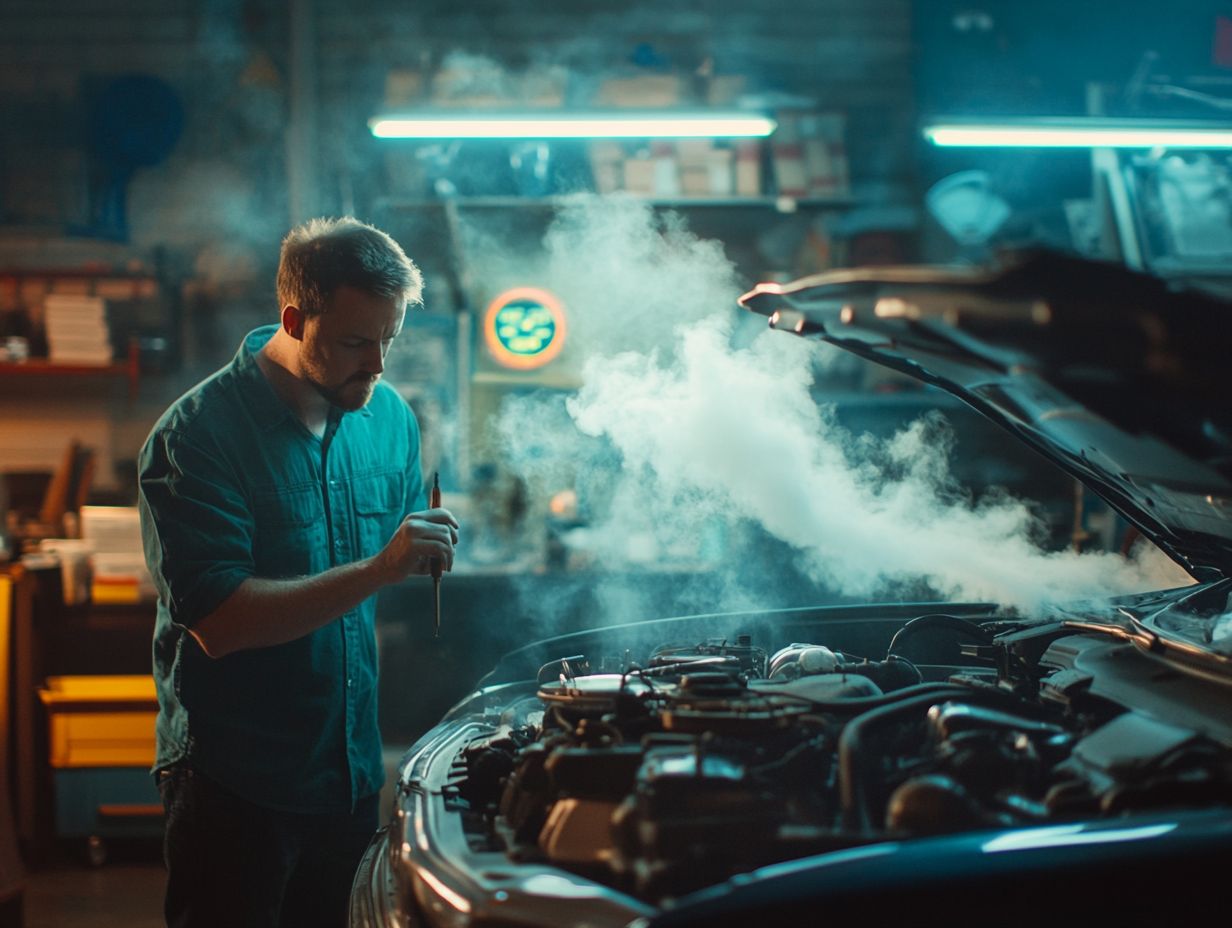
A noticeable coolant leak is a critical sign that your vehicle’s cooling system might be failing, often revealed by puddles of bright green, orange, or pink fluid beneath the engine.
These leaks can originate from various sources, such as worn hoses, loose clamps, or damaged gaskets. For instance, a cracked radiator or a faulty water pump can lead to significant fluid loss, which, if not addressed promptly, could jeopardize your engine’s performance.
Identifying these leaks is essential. You can often do this by consistently checking fluid levels and looking for any visible signs of leakage during your regular maintenance checks. It s crucial to schedule routine inspections, as this practice can help catch leaks early and keep your vehicle in top shape and ready for the road!
Strange Noises or Smells
Strange noises or odors coming from your vehicle should never be brushed aside; they often signal potential cooling system problems that could lead to serious damage.
For instance, if you notice a hissing sound, it might be steam escaping from a leak. Bubbling noises could indicate that air is trapped within the system. A strange sweet, syrupy smell in the cabin may suggest antifreeze leaks, which can pose significant risks if ignored.
To troubleshoot, it s wise to check your coolant levels and inspect the hoses for any signs of wear or leakage. If these simple fixes don t do the trick or if those unsettling sounds continue, it s best to consult a qualified mechanic. This proactive approach can prevent further damage and keep your vehicle running smoothly.
Causes of Cooling System Failure
Understanding the causes of cooling system failure is essential for you as a vehicle owner, as taking proactive measures can greatly extend the life of your engine.
Common culprits include the natural aging and wear of components like the radiator and water pump, which deteriorate over time. Insufficient maintenance can lead to coolant degradation (breakdown of your engine’s cooling fluid) and build-up.
By regularly checking your coolant levels and conducting thorough vehicle inspections, you can prevent many of these issues and significantly reduce the risk of overheating.
Age and Wear
Age and wear play a significant role in cooling system failure. The various parts within the system can gradually degrade due to relentless exposure to heat and pressure.
Recognizing the signs of aging in critical parts like the radiator and water pump is vital for maintaining optimal vehicle performance. A radiator displaying rust or corrosion or a water pump with visible leaks could indicate that these parts are nearing the end of their lifespan.
Remain vigilant about any unusual noises or signs of overheating, as these can signal underlying issues that may worsen if left unaddressed. Replacing worn parts proactively helps you avert costly repairs in the future and ensures that your cooling system operates at peak efficiency.
In doing so, you preserve your vehicle’s longevity and enhance its overall reliability.
Lack of Maintenance
Neglecting maintenance can significantly worsen cooling system issues, leading to problems like low coolant levels and a heightened risk of engine overheating.
Regular upkeep is vital to ensure your vehicle s cooling system functions at peak efficiency. Consistently checking coolant levels and flushing the system as recommended greatly reduces the chances of contaminants causing blockages.
Make sure to book regular inspections with a qualified mechanic. They can spot potential issues early on and carry out necessary adjustments or repairs. This proactive approach helps you avoid costly repairs and extends your engine’s lifespan, ultimately enhancing your vehicle’s overall performance.
Recognizing these maintenance tasks is key to promoting your vehicle’s long-term reliability.
Diagnosing Cooling System Problems
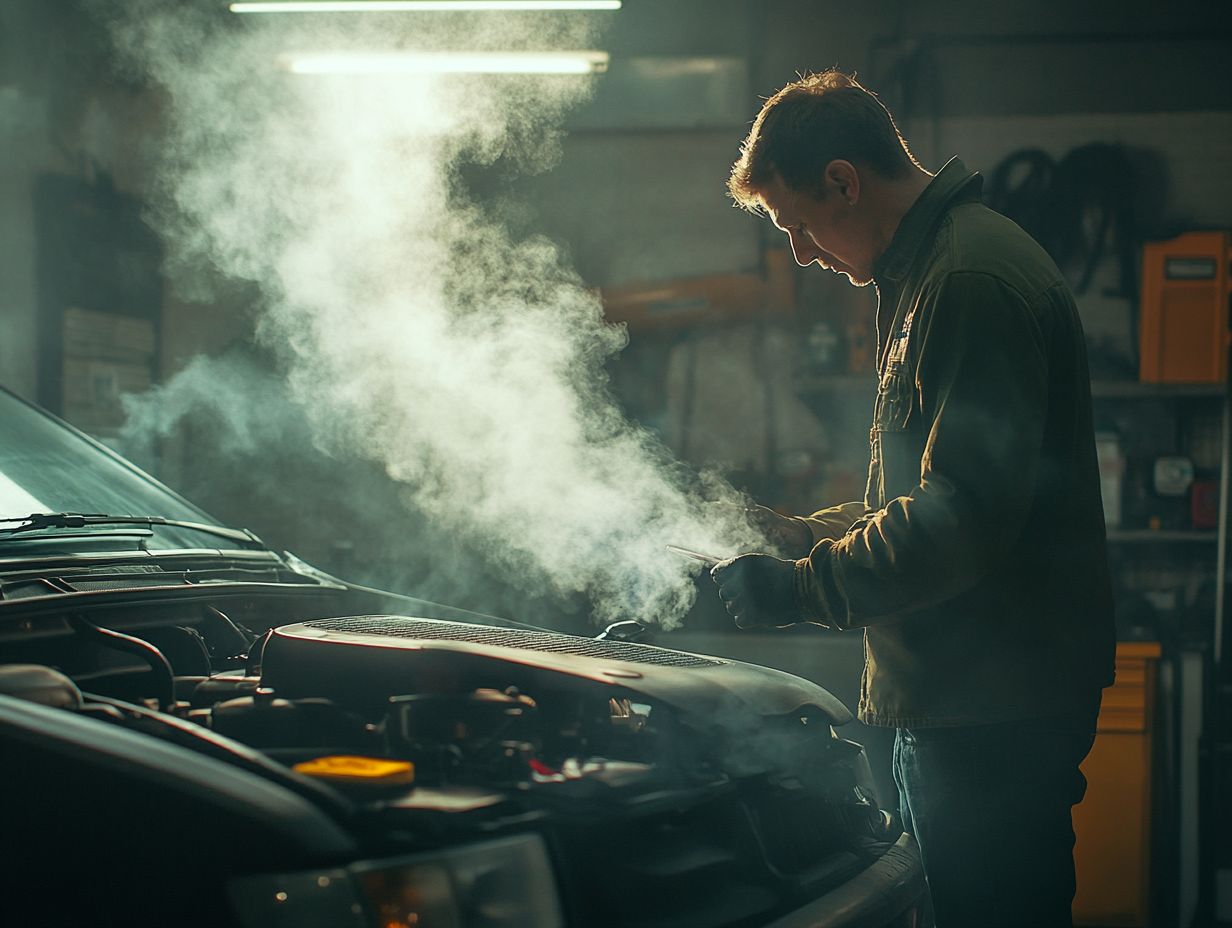
To effectively diagnose cooling system problems, you need a thorough inspection by a skilled automotive technician. They will meticulously assess various parts for signs of wear and potential malfunctions, ensuring that your vehicle receives the precise attention it deserves.
Inspection and Testing
Regular cooling system inspections and testing are crucial for ensuring your vehicle operates both efficiently and safely. Identifying potential issues early can prevent minor problems from escalating into major repairs.
An automotive technician will start with a thorough examination of your entire cooling system, visually inspecting parts for any obvious signs of wear or leaks. Next, they conduct pressure testing this means checking if the hoses and radiator can hold the right amount of pressure without any leaks.
After that, the quality of your coolant is evaluated, including its color, clarity, and contamination levels. This comprehensive approach extends the life of vital engine parts and promotes optimal performance, helping you avoid unexpected, costly repairs down the road. Regular inspections, conducted by skilled technicians, significantly reduce the risk of overheating and ensure your vehicle remains at its peak efficiency.
Preventing Cooling System Failure
Preventing cooling system failure is entirely within your grasp. By adopting a blend of maintenance tips and best practices, you can ensure both the longevity and efficiency of your vehicle.
- Regularly check coolant levels.
- Flush the cooling system as recommended.
- Book regular inspections with a qualified mechanic.
Every vehicle owner should embrace these strategies to safeguard against potential issues down the road.
Maintenance Tips and Best Practices
Effective maintenance tips can reduce the risk of cooling system failure. This helps your vehicle operate smoothly and efficiently.
Regular coolant checks are essential for maintaining optimal fluid levels and preventing overheating. Periodically cleaning the system helps eliminate contaminants that could impair performance. Vigilantly monitoring for leaks can save you from costly repairs later.
Conducting vehicle inspections at the recommended intervals is crucial for identifying potential issues early. By incorporating these practices into your maintenance routine, you can enjoy peace of mind and extend the lifespan of your cooling system.
Prioritizing these tasks enhances efficiency and ensures your safety on the road.
Take charge of your vehicle’s health today! Regular maintenance can save you from costly repairs down the road.
Frequently Asked Questions
What Are the Signs of Cooling System Failure?
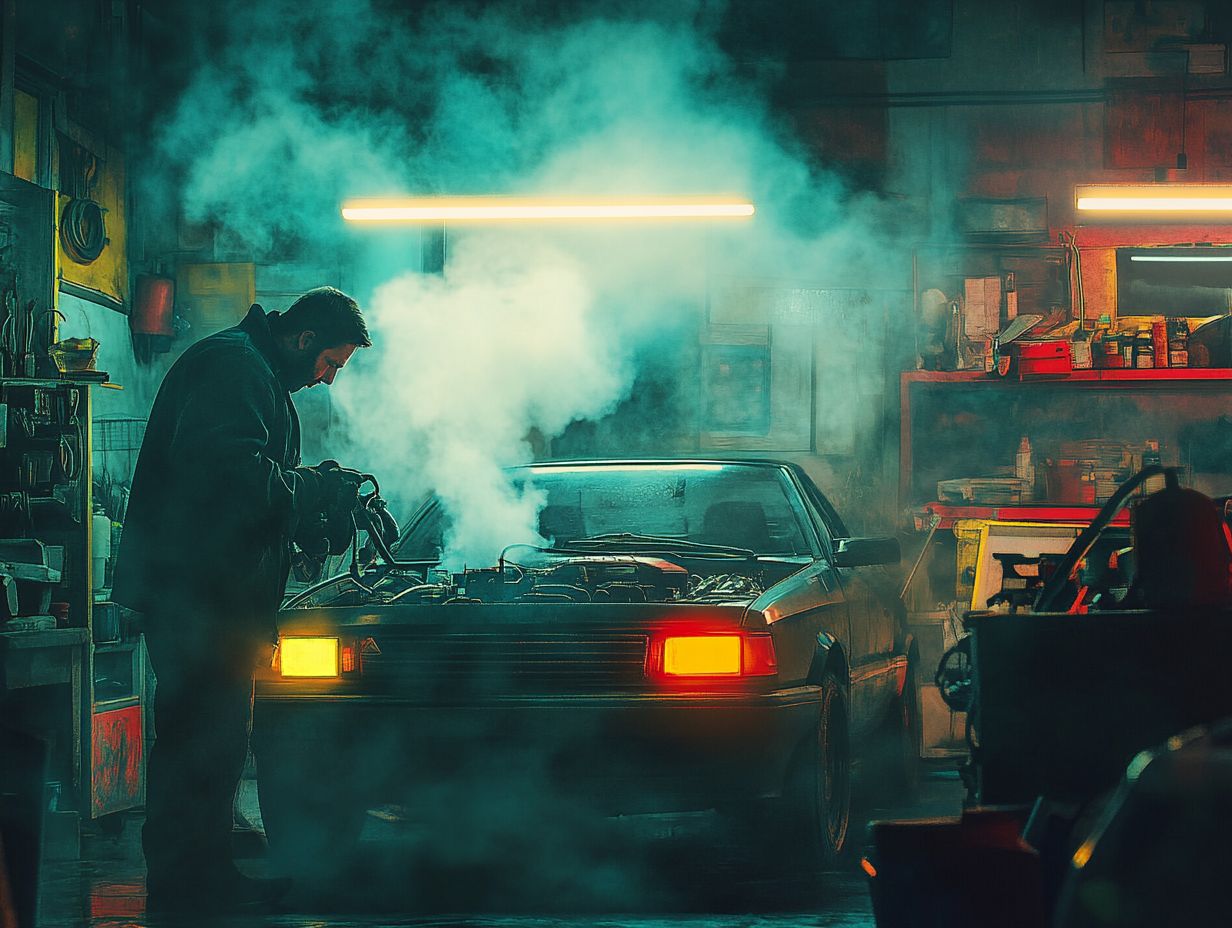
Cooling system failure is serious. Watch out for these signs!
What signs indicate cooling system failure?
The most common signs include:
- Engine overheating
- Low coolant levels
- Leaking coolant
- Strange smells coming from the engine
- White smoke or steam coming from the exhaust
Can low coolant levels indicate cooling system failure?
Yes, low coolant levels are one of the most common signs. It is important to regularly check and top off your coolant levels if needed.
What should I do if my engine is overheating?
If your engine is overheating, pull over immediately! Quick action can prevent serious damage. Check your coolant levels and fill them if necessary, and consider getting your cooling system checked by a mechanic.
Can leaking coolant be a sign of cooling system failure?
Yes, leaking coolant is a common sign of cooling system failure. Address any leaks as soon as possible to prevent further damage to your vehicle.
How often should I have my cooling system checked?
It is recommended to have your cooling system checked at least once a year. This can help catch any potential issues before they turn into major problems.

